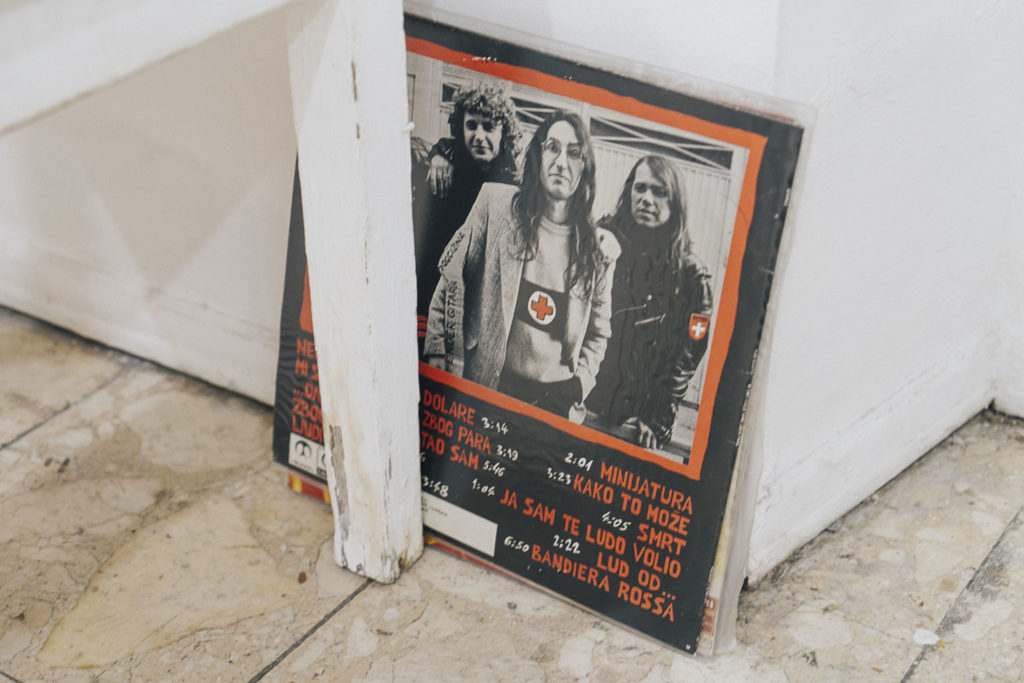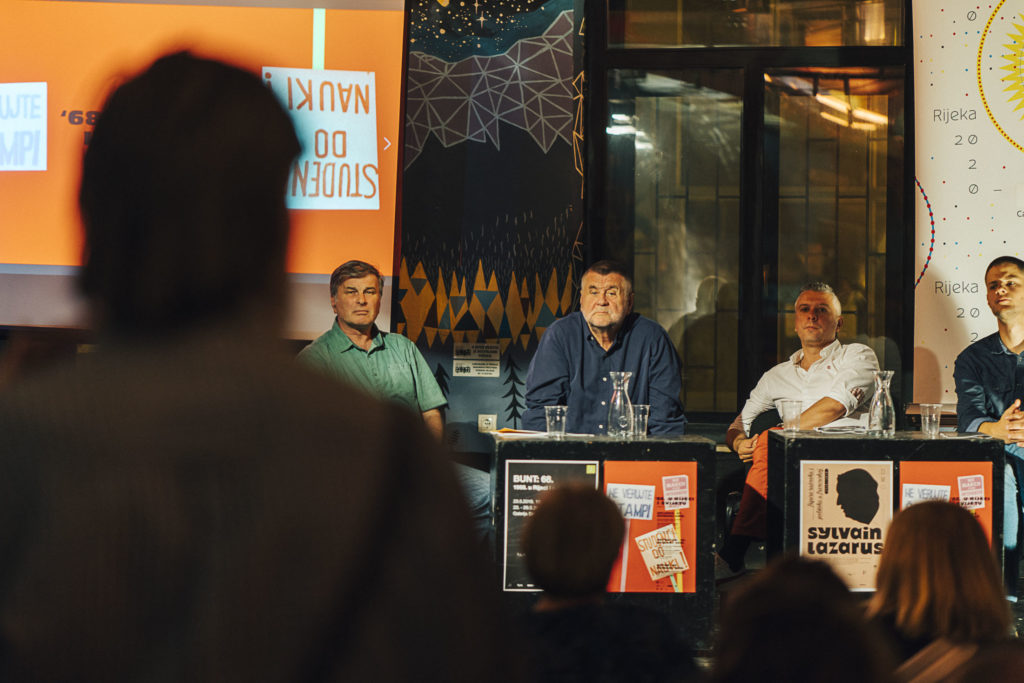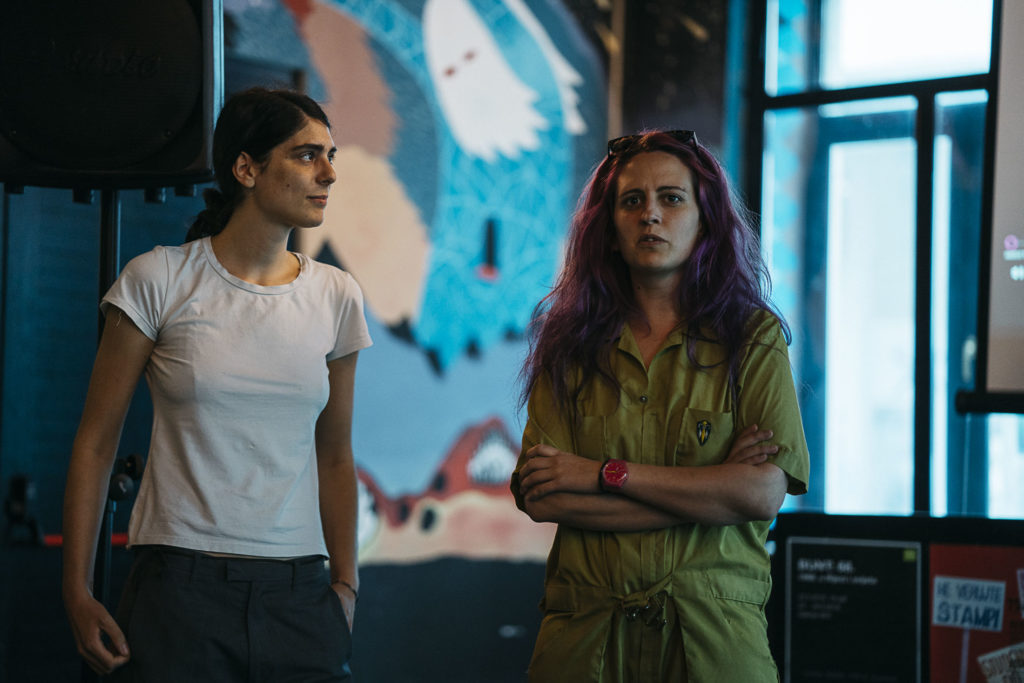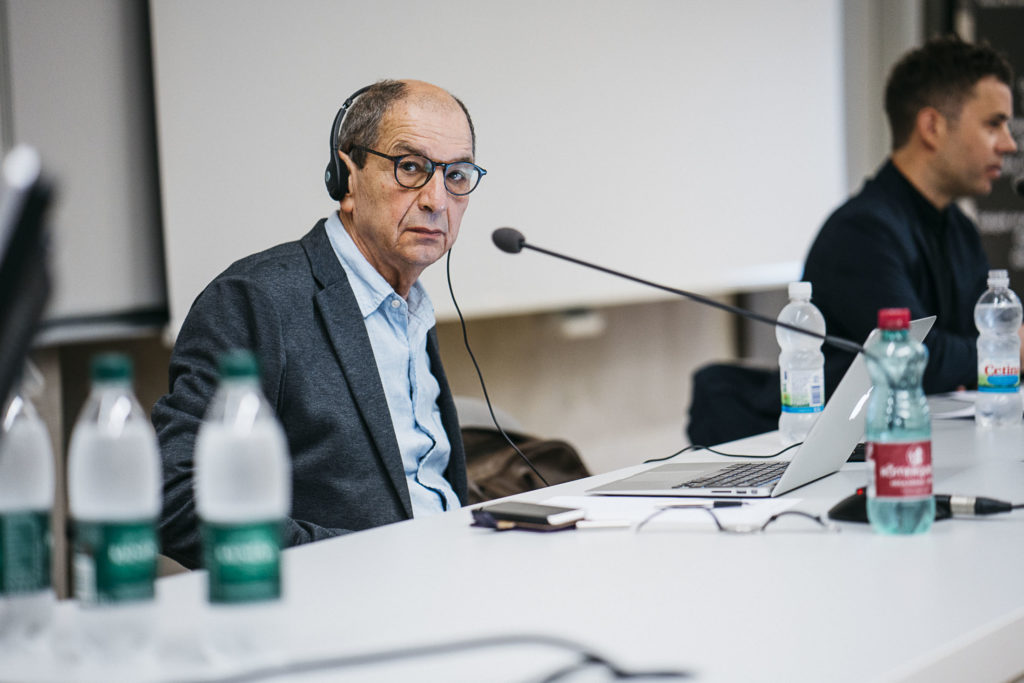In terms of socio-political events, the year 2018 is rich in specific symbolism: this year marks the 200th anniversary of the birth of the German philosopher Carl Marx, the 170th anniversary of the first edition of Marx’ and Engels’ Communist Manifesto, and 50 years since the anti-systemic protests in 1968, whose most famous version were probably the May protests in France.
At the same time these three events represent important milestones in the understanding of politics, society and culture, each in their own way. The views on these events are as divergent as these events are seminal: for example, the existence of the German philosopher Marx is not the same as the existence of Marx the “communist”. Equally, the ’68 protests have many different lives in the collective memory.
One of the attempts at dialogue with these versions of memory took place last week in Rijeka, where between 23 and 25 May an event took place under the lapidary title “’68 in Rijeka and the World”, dynamically organised by the Department of Cultural Studies of the Faculty of Philosophy in Rijeka, the Drugo more association, the SKC Gallery and the IKS Students’ Association, as part of the project Landscapes of Memory under the auspices of the Rijeka 2020 – European Capital of Culture and its programme line the Age of Power.
On class inequality: an exhibition and discussion „Revolt: ’68 in Rijeka and the World“
The programme, heterogeneous by genre, was designed on the basis of productive readings of social movements in Europe in 1968 and their transposition into contemporaneity. The opening of the entire programme took place at the SKC Gallery, which in Palach on 23 May hosted the exhibition “Revolt: ‘68 in Rijeka and the World”. The exhibition contrasts memories of events from that year, especially the processes of student resistance, disobedience, and consequently violence, and re-reads them from today’s position. The productivity of this gesture lies in the conjunction of two politically and socially separated periods, but which share similarities in the processes that they have been exposed to for decades: it is about problematising class inequality that has been the result of a neoliberal economic system in the last century coupled with parliamentary democracy, commoditisation (of knowledge, among other things) and the struggle for workers’ rights.
Eleven exhibitors thus shape a mosaic of experiences from a wider European context and locate it in the local and regional context. Historiographical research gave us the opportunity to read articles from Novi list and records from student assemblies, to watch short documentaries and texts that articulated support for protest in favour of increased workers’ rights in particular, i.e. in general a more egalitarian society since 1968.

A specific historical shift can be read on the very basic, linguistic levels. For example, the contour of the “worker” as a historical, economic and class category is seen as the terminological point zero in most of the activist-political writings. Today, however, the worker has been turned into a „staff member“, „employee“ or „colleague“. This linguistic shift is largely an economically-political one, given that the disappearance of workers as a category undermines the hierarchy of labour in favour of a feigned horizontality in the workplace. The field of activism has been defined from the outset as a political (systemic question), economic (question of doctrine) and cultural (question of rights and language) category.
Along with the opening of the exhibition, which shaped a specific activist aesthetics by displaying the signs and slogans in favour of publicly funded education, visitors could also attend a forum devoted to the same subject, featuring Croatian director Rajko Grlić, historian Hrvoje Klasić, journalist Neven Šantić and researcher Bruno Vignjević. The need to historise history was articulated during the forum in the form of attempts to transpose protest activities of the 1968 French or Czechoslovakian model on the Yugoslavian, where the student blockade was most significant in the context of the Belgrade University and, to a lesser extent, the Zagreb University. It is a question of experiencing differences – whereas France remembered the protests as an outstanding political event in the context of expanding workers’ rights and anti-systemic pressure, the Yugoslav experience – although the political establishment of the time was surprised – did not last and it was of limited scope. In a regional context, the student revolt did not affect other, overlapping classes of society, from the working to the middle classes, except sporadic support by professors.

In comparison, this case was well described in the 2017 documentary by Mila Turajlić The Other Side of Everything (Druga strana svega) in which the director focuses on the activist, political and intimate path of her mother, Srbijanka Turajlić, a political activist during the wars in Yugoslavia, a university professor but also Assistant Minister of Education in Serbia. Her position, bordering on three disparate but overlapping callings, made possible an interesting view on activism and politics and their separation in everyday life. Turajlić clearly states that the cooperation between “utopian” student activism and technocratic, everyday politics not only did not occur, but that such a civic intervention is a priori difficult to imagine. The intent of such politics is not to think of the future, but to rein in the present.
The student blockade of 2008 – an event that paralysed political structures
Documentarism also remained relevant the following day, 24 May, when OKC Palach hosted the screening of Plenumovie, the film about the student blockade in the Croatian and Rijeka context, by directors Marta Batinić, Ana Jurčić and Sanja Kapidžić. It is a documentary film made up of a collage of footage primarily from the Rijeka blockade of the Faculty of Philosophy, which mostly lasted from 22 April to 17 May 2009. Through a complete blockade of the teaching process it channeled students’ dissatisfaction with the Bologna process and expensive, unavailable education.
This film, one of the few covering this topic, takes on a crucial role in the significantly reduced and deficient space of activism and intellectual engagement in the field of social struggle for the disadvantaged. The militancy of the documentary is manifested – thus establishing a link with the protests of 1968 – in displaying student protests totally devoid of politicisation in the everyday sense. Student demands in 2009 – articulated across Croatia at more than 15 higher education institutions – were a prime example of politics, but not politics that could be communicated to bureaucrat politicians. The demand for constitutionally guaranteed public education available to everyone paralysed political structures. To a certain extent, the blockade remained the biggest student revolt since 1968, although its attempt at dialogue remained unanswered by official politics.

Although student blockades in Zagreb, Rijeka, Split, Pula, Zadar and other major Croatian cities brought real political results (such as the abolition of school fees for first year students), their gesture – as is well documented by the film – was even more radical. Student self-organisation through so-called plenums challenged the university’s position as educational hegemon, while interviews with students showed the mirroring of what the French philosopher Jacques Rancière described in his book The Ignorant Schoolmaster, commenting on the story of a French teacher from the early 19th century, Joseph Jacotot, who conceived unconventional teaching methods without full knowledge of the pupils’ language, developing the notion of “intellectual emancipation”.
The teaching process, as Rancière claims, is traditionally established as a hierarchy, where one side is proclaimed “learned” and the other ignorant, i.e. the side that has yet to be taught. In the educational system the power of education lay in the hands of teachers who expressed their power by first naming knowledge, and then proclaiming themselves learned. Jacotot’s goal was an education within which the teacher would not teach students how to achieve his learnedness, but rather explain the learning process itself. It is feedback that he very concisely explains by saying: “Teaching without emancipating means dulling the mind”.
Politics that is not trying to create new systems on the ashes of old ones
This fundamental counter-hegemonic request of political activism was the subject of a discussion held on 25 May at the Faculty of Philosophy in Rijeka with the participation of one of the most famous French thinkers of the twentieth century, Sylvain Lazarus, and moderated by doc. Dr. Sc. Ozren Pupovac from the Department of Cultural Studies. Lazarus shaped the dialectics of reflection on politics, activism, and labour rights into a highly influential 1996 study called Anthropology of the Name, as well as through his reflections on 1968 in France as a political event “at a distance from the State”. Thus, his visit connected but also explained the events that were discussed in the past few days. As I have already suggested, the problem in question is a kind of “nervousness” and the inability to recognise activism as politics of reflection (but also the reflection of politics) that Lazarus in this study presents as an important emancipatory moment. For example, on the one hand, student protests in 1968 at the regional level remained unrecognised as a question that leaves the confines of pure student revolt. On the other hand, the student blockade in 2009 felt the state’s lack of interest for the consideration of politics.
Lazarus deals with the stated potential for the reflection of politics. As we’ve heard, he believes that social sciences today have difficulty with reflecting on the future because they are focused on the analysis and description of the present. He argues that this crisis is caused by the expulsion of politics from the domain of thinking, as well as by the expulsion of politics from the domain of life.
Specifically, Lazarus understands politics as practice: the question is not merely the extent of its criticism of something (criticism of a capitalist economy, for example), but the reach of thinking about something. And to him the protests of 1968, to the extent that they do represent something politically, were not the recognition of everyone in their own place in society (a peasant, a worker, a student…) but the destruction of their place of recognition in society.
Lazarus’s militancy is manifested as politics from the people’s rather than the state’s point of view, i.e. a view of politics as something that is set singularly. The connection of our blockades and the May protests in 1968 is precisely the existence of a revolution that does not suggest alternatives to the current state. In this Lazarus sees the greatest opportunity for a sovereign reflection of politics – one that does not try to create new systems on the ashes of old ones.

For example, his advocating of politics as practice or politics as a system of specific rather than general problems is related to the Rijeka experience of blockade as seen in the Plenumovie documentary. Students’ demands are formed singularly in anonymity of the masses, uniquely through the multitude: without authors and authority. The blockade was not a reflex of utopian impulses by young students – it was one of the few moments of contemporary political initiative in Croatia where culture became a field of battle: the struggle for appointment and meaning (what does publicly funded education mean); struggle for visibility (media blockade in reporting); struggle for dialogue (students and professors in the horizontal, Rancièresque hierarchy and students with particular and different politics in relation to each other), and ultimately, the struggle for a reflection on the future.
His well-attended lecture in Rijeka was the culmination of all open issues during these three days – first of all, the translation of politics into the domain of culture and activism. The panel that was held after the screening of Plenumovie, which was attended by participants of the Rijeka blockade, Bruno Nedoklan, Zoran Jančić, Ivana Kljajić and Renato Stanković opened up as a productive place for reading Lazarus’s “politics of interiority”. The plenum in its demands mirrored a gesture that Herman Melville described in his short story Bartleby, the Scrivener, in which a clerk begins working at a lawyer’s office, but refuses to perform his duties. He does it in a Mannerist fashion by meeting the demands of his superior with the words “I would prefer not to”. This is neither refusal, nor consent, but an active (“prefer”) negotiation with not doing (“I would … not to”).
Lazarus similarly interprets politics that does not negotiate with the existing situation, neither by refusing nor by consenting, but by seeking and imagining a new framework for action that is not equivalent to the old one. The student blockade plenum was just as politicised in its demand that did not mirror the hierarchy of the past, but was trying to imagine new forms of reflection on things political.
The blockade crisis to which the filmmakers dedicate most of the time is contained in a Bartleby-like gesture: “We would prefer not to talk to the state politics, i.e. the ministry”. It is not a rejection of politics, but rather a fundamental gesture of reflection on the demand for publicly funded education.
This simplicity of requirements belies the true depths of politics on which Lazarus reflected on Friday: the rejection of boiling down politics (knowledge as a public good) to demagoguery (let’s negotiate with the state). And the lecture, as well as the events that preceded it, was attended by a large audience which gives hope that the reflection on politics beyond technocratic “negotiations” will not be forgotten any time soon. Films, forums and lectures held from 23 to 25 May are one of the few tokens that still keeps alive the memory of these events – productive ruptures in the system – that still make it possible to imagine a completely different tomorrow. Because we would prefer not to live in this one.



